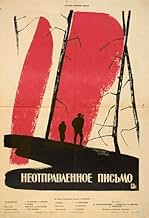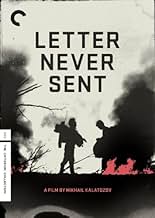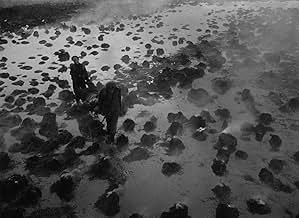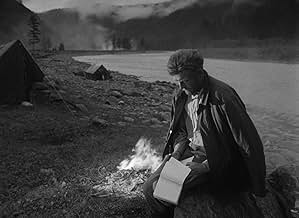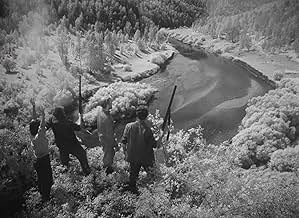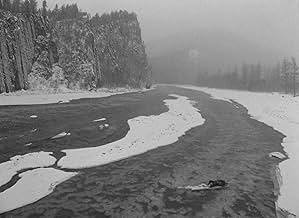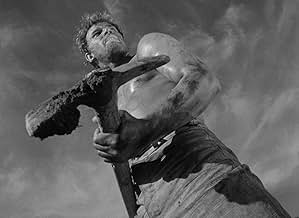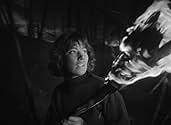IMDb-BEWERTUNG
7,8/10
4681
IHRE BEWERTUNG
Vier Geologen suchen in der Wildnis Sibiriens nach Diamanten.Vier Geologen suchen in der Wildnis Sibiriens nach Diamanten.Vier Geologen suchen in der Wildnis Sibiriens nach Diamanten.
- Auszeichnungen
- 1 Nominierung insgesamt
Innokentiy Smoktunovskiy
- Konstantin Sabinin
- (as I. Smoktunovskiy)
Tatyana Samoylova
- Tanya
- (as T. Samoylova)
Vasiliy Livanov
- Andrey
- (as V. Livanov)
Evgeniy Urbanskiy
- Sergey Stepanovich
- (as Ye. Urbanskiy)
Galina Kozhakina
- Vera
- (as G. Kozhakina)
Empfohlene Bewertungen
Welcome to Siberia, circa 1959 (in perfectly restored, glorious Black and White).
Although this story revolves around four 'pioneers' dropped into a vast wilderness to search for a rumored vein of diamonds (aka 'the Diamond Pipe'), the real star of the movie is cinematographer Sergei Urusevsky ("Soy Cuba," "The Cranes Are Flying").
Urusevsky is master of composition, dolly shots, and hand-held photography (when necessary). The way he frames his close-ups of the actors practically allows the audience to see into their souls.
Of course, it helps that he's shooting a top-notch Russian cast, including actress Tatyana Samojlova ("The Cranes Are Flying") whose character 'Tanya' is desperate to survive the troubling events that befall the group. Tanya is also the lone female and commands the attentions of two men in the rock-sampling group (though one is unrequited).
In addition, the visual elements are underscored aurally by composer Nikolai Kryukov's ("The Forty-first") evocative score, although he does amp up the music a bit too much in a couple of scenes. Not unusual for the time period, so set your appreciation meter back to the 50's and you won't be as bothered as I was.
The title of the film refers to not one but two letters that figure into the plot. One is a long, personal letter that is referred to in voice-over from time to time throughout the film, while the other is a love letter thought to be hidden away until it accidentally comes to light.
The plot is very straightforward so I won't spoil any surprises by detailing it here, suffice to say that the main attractions of this film are the artistic cinematography, the strong cast, and the director's choice to foreshadow plot elements by overlaying fiery images over his hardcharging trekkers.
If you've never seen any films by director Mikhail Kalatozov ("The Red Tent," "Soy Cuba," "The Cranes Are Flying"), then this one is probably as accessible as any and with a new restoration to boot, practically a MUST-SEE.
The ending alone is worth the price of admission, so check it out festival goers.
Although this story revolves around four 'pioneers' dropped into a vast wilderness to search for a rumored vein of diamonds (aka 'the Diamond Pipe'), the real star of the movie is cinematographer Sergei Urusevsky ("Soy Cuba," "The Cranes Are Flying").
Urusevsky is master of composition, dolly shots, and hand-held photography (when necessary). The way he frames his close-ups of the actors practically allows the audience to see into their souls.
Of course, it helps that he's shooting a top-notch Russian cast, including actress Tatyana Samojlova ("The Cranes Are Flying") whose character 'Tanya' is desperate to survive the troubling events that befall the group. Tanya is also the lone female and commands the attentions of two men in the rock-sampling group (though one is unrequited).
In addition, the visual elements are underscored aurally by composer Nikolai Kryukov's ("The Forty-first") evocative score, although he does amp up the music a bit too much in a couple of scenes. Not unusual for the time period, so set your appreciation meter back to the 50's and you won't be as bothered as I was.
The title of the film refers to not one but two letters that figure into the plot. One is a long, personal letter that is referred to in voice-over from time to time throughout the film, while the other is a love letter thought to be hidden away until it accidentally comes to light.
The plot is very straightforward so I won't spoil any surprises by detailing it here, suffice to say that the main attractions of this film are the artistic cinematography, the strong cast, and the director's choice to foreshadow plot elements by overlaying fiery images over his hardcharging trekkers.
If you've never seen any films by director Mikhail Kalatozov ("The Red Tent," "Soy Cuba," "The Cranes Are Flying"), then this one is probably as accessible as any and with a new restoration to boot, practically a MUST-SEE.
The ending alone is worth the price of admission, so check it out festival goers.
9Fpi
This is a totally excellent man vs. nature drama. An outstandingly dramatic soundtrack is coupled with some of the most powerful and unique visuals I've ever seen. If you thought Tarkovsky was a one-shot in the Soviet Union when it came to beautiful yet haunting images, you'll definitely think again after this movie. The characters and the story are perhaps not too well developed, but this somehow adds to the sense of not being totally in control, which is important here. It's nothing short of a tragedy that this movie is totally unknown; it would probably have been a candidate of reaching IMDb's top 50 if it were. Those looking for unknown classics should hunt this one down at all costs.
Among a panoply of scintillating things about this film is Sergei Urusevsky's deft black-and-white cinematography, much of it hand-held. Urusevsky seems to understand semiotics deeply, and his shots are often protean, shifting angle or perspective during a take to wring extra emotional import from it. I found myself rewinding many sequences and rewatching because of how well Urusevky, arguably the greatest Soviet era lensman, can minimally change vantage or tilt and bring fresh meaning cascading from the actors.
"Letter Never Sent" has communistic political messages in it, but is sumptuously acted by a small cast with a good sense of ensemble. Heat and cold, fire and ice, land and water, remote wildness and safe civilization all exist here in dynamic tension. The version in digital circulation is lovingly restored. A must-watch, especially for admirers of other quintessential Russian filmmakers such as Tarkovsy.
"Letter Never Sent" has communistic political messages in it, but is sumptuously acted by a small cast with a good sense of ensemble. Heat and cold, fire and ice, land and water, remote wildness and safe civilization all exist here in dynamic tension. The version in digital circulation is lovingly restored. A must-watch, especially for admirers of other quintessential Russian filmmakers such as Tarkovsy.
This robust survival adventure follows a team of Soviet geologists stranded in the wilderness of Siberia after a forest fire severs their communication link with civilization. The opening dedication to Socialist heroes everywhere and the noble sacrifices made by each character carry the story dangerously close to propaganda, but the intensity of their ordeal (through smoke and fire, over snow and ice, across mountains and tundra) thankfully overwhelms the political simplicity of the script. Unfortunately, it also overwhelms the initial hints of tension between each of the four characters (three male, one female) after the struggle to survive becomes paramount. The sense of isolation and exposure is numbing; the film was directed with a strong sense of visual drama (including more than one knockout montage), showing everything an audience would ever want to know about being lost in Siberia.
In Mikhail Kalatozov's Letter Never Sent, four geologists are searching for diamonds in the wilderness of Siberia. Three men, one woman. Andrei and Tanya are in love. Sergei is in love with Tanya. Sergei is a strong man who had been on such expeditions but had returned with no luck. He is jealous of the nerdy Andrei's and the beautiful Tanya's relationship but never cares to hide that feeling. Sabinine (The Leader of the expedition) often spends his free time writing letters, which he will never send, to the woman he once loved. This is how the film begins: By presenting a set of characters, each having different perspectives but are present in the wild forests of Siberia for one reason. With the hope of serving their country, they are present there hunting for a diamond vein. It's no surprise that the diamond deposit is discovered in the film after days of hard work. Previous expeditions had failed but this one expedition proved that there indeed was a diamond deposit in Siberia. Soon, the four geologists, filled with zeal and satisfaction, find themselves engulfed by a huge forest fire and completely cut of from the civilized world. Will they survive?
Before the opening credits, the film pays tribute to the people of the Soviet Union who have given their lives for the benefit of the country, whether it be astronauts seeking answers for the mysteries of space or geologists going in to the wilderness hunting for diamonds. Throughout the entire film, we see the characters suffering in the piercing cold and bleak atmosphere of Siberia. Their goal at this point is to safely deliver the map, on which the whereabouts of the diamond deposit is marked, to Moscow. We see sacrifice. We witness loss. We witness alienation, hunger, despair. This is where I realized that similar to numerous Soviet films, Letter Never Sent contains shards of Propaganda. Adventure? Nope. I look at this one as a miserable survival film filled with some unnecessary moments of melodrama, patriotism and hyperactivity. The fact is that I don't mind patriotism and propaganda. But in this case it's overdone. I just didn't care for any of the characters. Not even the gorgeous Tatiana Somailova whose performance in the 1957 Soviet Classic The Cranes are Flying (Also directed by Mikhail Kalatozov) was spellbinding. It was because of this film that I was intrigued to check out Letter Never Sent.
Now the big question: What relation does the film and it's title have? As stated earlier, Sabinine wrote letters to a woman he loved from his past. He wrote them, feeling nostalgic, without the intention of sending them (Of course, the team is already in the middle of nowhere). This relation is explained further in the final moments of the film but it's significance is again directed more towards patriotism, in my opinion. Another disappointing aspect.
Unlike the ingenious masterpiece The Cranes are Flying, this film lacks true emotions. I went in with high hopes of seeing another Soviet masterpiece but eventually I was left disappointed. Albeit this film failed to emotionally engross me, Sergei Urusevsky's miraculous cinematography makes the film worth watching. Urusevsky and Kalatozov have collaborated in multiple films and their most well known work is of course The Cranes are Flying, where the film used astonishing camera- work. Though I believe Letter Never Sent takes it to a whole new level by composing unbelievable images. The camera work is well ahead of it's time. It looked like that the camera glided through the wild fire and the horrible blizzards very smoothly. The technical artistry of this film deserves a standing ovation and at times it completely overpowers the dissatisfying screenplay.
On the positive side, Letter Never Sent is one of the strongest proofs of how visually powerful cinema can be. If you ever tell me to compile a top 10 list of the most visually stunning films ever crafted, this one will gladly make it to the top 5. Mr. Urusevsky, you rock. (And I will highly recommend The Cranes are Flying in case you haven't seen it yet).
filmsmostbeautifulart.blogspot.in
Before the opening credits, the film pays tribute to the people of the Soviet Union who have given their lives for the benefit of the country, whether it be astronauts seeking answers for the mysteries of space or geologists going in to the wilderness hunting for diamonds. Throughout the entire film, we see the characters suffering in the piercing cold and bleak atmosphere of Siberia. Their goal at this point is to safely deliver the map, on which the whereabouts of the diamond deposit is marked, to Moscow. We see sacrifice. We witness loss. We witness alienation, hunger, despair. This is where I realized that similar to numerous Soviet films, Letter Never Sent contains shards of Propaganda. Adventure? Nope. I look at this one as a miserable survival film filled with some unnecessary moments of melodrama, patriotism and hyperactivity. The fact is that I don't mind patriotism and propaganda. But in this case it's overdone. I just didn't care for any of the characters. Not even the gorgeous Tatiana Somailova whose performance in the 1957 Soviet Classic The Cranes are Flying (Also directed by Mikhail Kalatozov) was spellbinding. It was because of this film that I was intrigued to check out Letter Never Sent.
Now the big question: What relation does the film and it's title have? As stated earlier, Sabinine wrote letters to a woman he loved from his past. He wrote them, feeling nostalgic, without the intention of sending them (Of course, the team is already in the middle of nowhere). This relation is explained further in the final moments of the film but it's significance is again directed more towards patriotism, in my opinion. Another disappointing aspect.
Unlike the ingenious masterpiece The Cranes are Flying, this film lacks true emotions. I went in with high hopes of seeing another Soviet masterpiece but eventually I was left disappointed. Albeit this film failed to emotionally engross me, Sergei Urusevsky's miraculous cinematography makes the film worth watching. Urusevsky and Kalatozov have collaborated in multiple films and their most well known work is of course The Cranes are Flying, where the film used astonishing camera- work. Though I believe Letter Never Sent takes it to a whole new level by composing unbelievable images. The camera work is well ahead of it's time. It looked like that the camera glided through the wild fire and the horrible blizzards very smoothly. The technical artistry of this film deserves a standing ovation and at times it completely overpowers the dissatisfying screenplay.
On the positive side, Letter Never Sent is one of the strongest proofs of how visually powerful cinema can be. If you ever tell me to compile a top 10 list of the most visually stunning films ever crafted, this one will gladly make it to the top 5. Mr. Urusevsky, you rock. (And I will highly recommend The Cranes are Flying in case you haven't seen it yet).
filmsmostbeautifulart.blogspot.in
Wusstest du schon
- WissenswertesIn 1995 the film was restored by and shown in United States upon the financial support from Francis Coppola.
- Zitate
Andrey: Sergei, you've fallen in love with a girl who loves someone else, and that man loves her. From the moral standpoint it's wrong.
Sergey Stepanovich: I don't give a damn about your bookish morale. I'm in love.
Andrey: That's an egoist speaking.
- VerbindungenFeatured in Fejezetek a film történetéböl: A szovjet film 1953-1970 (1990)
Top-Auswahl
Melde dich zum Bewerten an und greife auf die Watchlist für personalisierte Empfehlungen zu.
- How long is Letter Never Sent?Powered by Alexa
Details
- Erscheinungsdatum
- Herkunftsland
- Offizieller Standort
- Sprache
- Auch bekannt als
- Letter Never Sent
- Drehorte
- Produktionsfirma
- Weitere beteiligte Unternehmen bei IMDbPro anzeigen
- Laufzeit
- 1 Std. 36 Min.(96 min)
- Farbe
- Sound-Mix
- Seitenverhältnis
- 1.37 : 1
Zu dieser Seite beitragen
Bearbeitung vorschlagen oder fehlenden Inhalt hinzufügen

